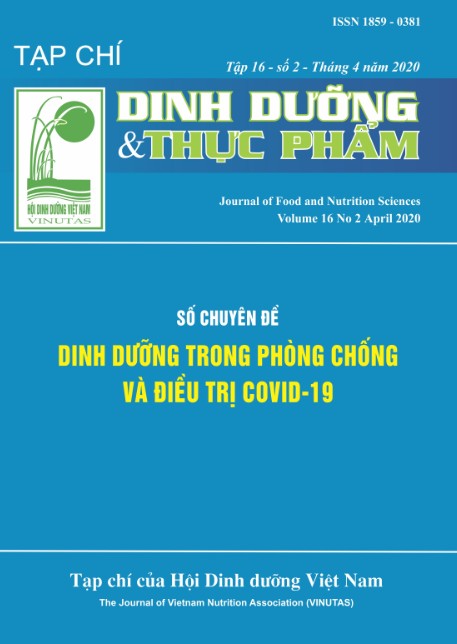IMPACT OF MILK-CAKE FORTIFICATION ON MICRO NUTRIENT STATUS OF CHILDREN FROM 6 – 9 YEARS OLD IN 2 PRIMARY SCHOOLS AT CO DO DISTRICT, CAN THO CITY
Main Article Content
Abstract
Objective: Evaluate the impact of milk-cake fortification on micro - nutrient status of children from 6 – 9 years old in 2 primary school at Co Do district, Can Tho city.
Methods: A randomized, double-blind, placebo controlled trial was conducted among 370 primary school children, aged 6–9 years old, in 2 primary school at Co Do district, Can Tho city, Viet Nam (2012 – 2013). All of the participants joined in the study had not known which milk-cake fortified the nutrients until the statistics analyzed. All of them were divided into 2 groups: I (185) ate milk-cake with muti-micronutrient fortification and II (185) ate milk-cake without muti-micronutrient fortification. The multi-micronutrient were fortified in milk-cake including vitamin A, vitamin D, zinc, iode and calcium. Each of them was received a milk-cake everyday x 5 days/week. All of the children were dewormed by Albendazole 400 mg at baseline; the 24-hour recall of amount of foods consumed, blood and urine samples were collected from all children at baseline (T0) and the end point (T6). The cut-off to evaluate micro – nutrient deficiency: Hb concentration < 115 g/L; serum Vitamin D < 50ng/mL; total calcium < 2,1 mmol/L (84mg/L); urinary iodine concentration < 10 µg/dL.
Results: After 6 months, the serum Vitamin D of group I (milk-cake with multi-micronutrient fortification) increased significantly than group II (milk-cake without multi-micronutrient fortification) with p<0,05. The average total calcium of group I increased significantly than group II (p<0,05). The median urinary iodine of group I increased significantly than group II (p<0,05)
Conclusions: Multi-micronutrient fortification of milk-cake (including vitamin A, vitamin D, zinc, iode and calcium) is an effective strategy to improve the micro - nutrient status of children from 6 – 9 years old in 2 primary schools at Co Do district, Can Tho
city, Viet Nam.
Keywords
Micro - nutrients, impact, effective, multi-micronutrient fortification, primary school children, Co Do district, Can Tho


